This piece is part of a series titled “Nonstate armed actors and illicit economies: What the Biden administration needs to know,” from Brookings’s Initiative on Nonstate Armed Actors.
Thanks to Saudi Arabia’s reckless decision to intervene in Yemen six years ago, Iran has acquired a non-state ally in the Arabian Peninsula along with a base to threaten the Bab el-Mandeb, the strategic waterway that links Europe to the Indian Ocean. Tehran has gained an unprecedented strategic advantage with very little expenditure of human and financial resources. The Biden-Harris administration should make ending the war an urgent priority.
The Houthis: A primer
Iran’s allies are the Houthis. The Houthis are Zaydi Shiites, or Zaydiyyah. Shiite Muslims are the minority community in the Islamic world, and Zaydis are a minority of Shiites, significantly different in doctrine and beliefs from the Shiites who dominate in Iran, Iraq, and elsewhere (who are often called “Twelvers,” for their belief in 12 Imams).
The Zaydis take their name from Zayd bin Ali, the great grandson of Ali — the prophet Muhammad’s cousin and son-in-law — whom all Shiites revere. Zayd bin Ali led an uprising against the Umayyad Empire in the year 740, the first dynastic empire in Islamic history, which ruled from Damascus. Zayd was martyred in his revolt, and his head is believed to be buried in a shrine to him in Kerak, Jordan. Zaydis believe he was a model of a pure caliph, who should have ruled instead of the Umayyads. Zaydis have ruled Yemen for generations, but the modern political movement emerged as opposition to the rule of dictator Ali Abdullah Saleh in the 1990s.
The reckless American invasion of Iraq in 2003 deeply radicalized the Houthi movement, like it did many other Arabs. In the wake of the invasion, the Houthis adopted the slogan: “God is great, death to the U.S., death to Israel, curse the Jews, and victory for Islam.” The group also officially called itself Ansar Allah, or supporters of God. It was a turning point largely unrecognized outside Yemen, another unanticipated consequence of George W. Bush’s blundered misadventures in Iraq.
Hezbollah, the Shiite movement in Lebanon that successfully expelled the Israeli army from the country, became a mentor and role model for the Zaydi rebels. The Houthis fought a series of campaigns against Saleh’s government between 2004 and 2010, with little outside support (mostly from Hezbollah, rather than directly from Iran). After the Arab Spring in 2011, the Houthis reversed course and aligned with Saleh.
Enter: The Americans and Saudis
As I’ve also written previously — including in partnership with John R. Allen — Saudi Arabia led a coalition of states to intervene in Yemen’s civil war early in 2015, when the Houthi rebels seized the capital of Sana’a and agreed to allow direct flights between Sana’a and Tehran, as well as Iranian access to the port of Hodeidah. In 2015, the Iranians and Hezbollah had only dozens of advisers and experts in Yemen, and had trained a handful of Houthis in Iran and Lebanon.
Now their presence is much larger, and they provide critical expertise and equipment to assist the Houthi missile and drone program that keeps up a steady fire on Saudi cities and military bases as well as Aden, the port city in South Yemen where the Saudi-supported regime operates. Despite the Saudi blockade and American interception efforts, the Iranians are steadily getting aid to the rebels. This costs Iran a pittance, compared to the tens of billions of dollars the Saudis have spent on the war. It is a very expensive quagmire for Riyadh.
This fall, Iran sent its first ambassador to Yemen since the old government expelled the last one in 2015. Ambassador Hassan Irloo presented his credentials to the Houthi foreign minister. The State Department says Irloo is a career officer in the Islamic Revolutionary Guards Corps and has worked extensively with Hezbollah. The choice of an IRGC officer is a reflection of Tehran’s confidence in its role in Yemen, and its optimism about the Houthis’ military situation. Iran is the only country to recognize the Houthi government, so it has no competition in exerting influence in Sana’a. For their part, the Houthis have ambassadors in Tehran and Damascus.
The architect of the Saudi-led war is Crown Prince Muhammad bin Salman, who has no military training or experience. He has bungled the job from the start. The crown prince is pressing Washington to designate the Houthis as a Foreign Terrorist Organization (FTO). The Houthis are a violent and dangerous organization — with very extremist propaganda — but they have not attacked Americans or Israelis, despite their rhetoric.
The Department of State has announced it will designate the Houthis as an FTO, which will also hamper the efforts of humanitarian relief organizations to get food and medicine to Yemeni civilians living in the territory that the rebels control. The United Nations estimates that 80% of Yemenis are at risk of malnutrition, and that Yemen is in “a countdown to catastrophe.” The pandemic has made the situation immensely worse. Yemen’s primitive health care infrastructure, which is a frequent target of Saudi air strikes, is overwhelmed. The Houthis are hard to work with, according to humanitarian leaders, but designating them an FTO will make an already difficult situation worse, and will reap little practical benefit that might otherwise flow from an FTO designation given that they are already isolated.
The United States has backed the Saudi war from its start with arms deliveries and diplomatic support. President-elect Joe Biden was part of the team that decided to back Riyadh in 2015. He needs to lead the effort to end the war now. It is long past time for a fundamental change. The war benefits Iran and Hezbollah. It gives Iran a stronghold in a strategically important global crossroads.
Managing the Houthis right
The Houthis are non-state actors that aspire to be recognized as the legitimate rulers of Yemen. The United States had a dialogue with the Houthis before 2015. The Pentagon’s then-Undersecretary of Intelligence Michael Vickers said the insurgents were providing useful information on al-Qaida in 2015, information that helped American counterterrorism missions. The commander of U.S. Central Command (CENTCOM) at the time, General Lloyd Austin (now Biden’s choice for secretary of defense), was particularly unhappy with the Saudi decision to attack the Houthis, because they were an ally against al-Qaida. So despite their rhetoric, the Houthis can be a partner with America.
But treating them as an Iranian puppet may well lead them to conducting terrorism against Americans. The Houthis have a horrendous human rights record and are thugs. But they are a reality that must be dealt with, and clearly there is no military solution to the challenge they pose. The last thing we want is to turn the Houthis into a terrorist organization targeting Americans for the horrible humanitarian catastrophe in Yemen.
One place the United States can start changing its policy is in the United Nations Security Council. At the start of the war, the council passed a one-sided resolution that blamed only the Houthis for the war, and instituted an arms embargo solely on them. The United States joined 13 council members to vote for the resolution; only Russia abstained, saying the resolution was unbalanced and would not contribute to achieving peace. Moscow was right. Biden should instruct Antony Blinken, if confirmed as secretary of state, to secure passage of a new, balanced resolution that demands an end to Saudi Arabia’s intervention in Yemen, and an immediate unconditional lifting of the blockade.
Getting a new legal basis for the diplomacy to end the war would also have the benefit of bringing the international community behind the effort. The U.N. special envoy would have his engagement significantly enhanced. Indonesia is a U.N. Security Council member that could play an important role as the world’s largest Muslim country with a historic link to the Arabian Peninsula. Building an international consensus to end the war and pursue diplomacy should be our objective in 2021.
The Brookings Institution is committed to quality, independence, and impact.
We are supported by a diverse array of funders. In line with our values and policies, each Brookings publication represents the sole views of its author(s).

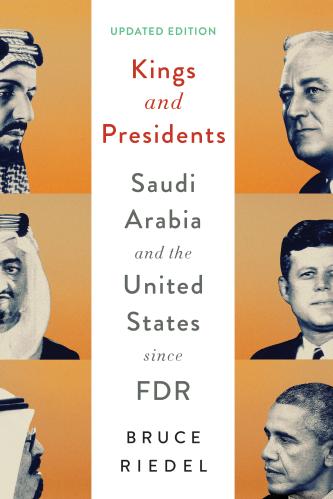
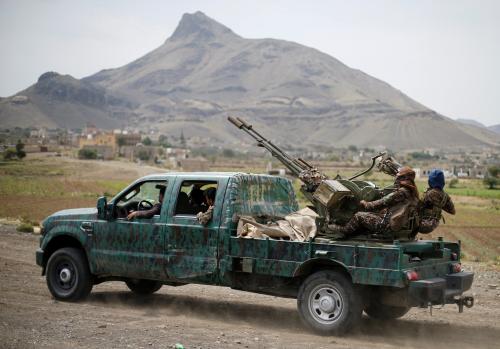
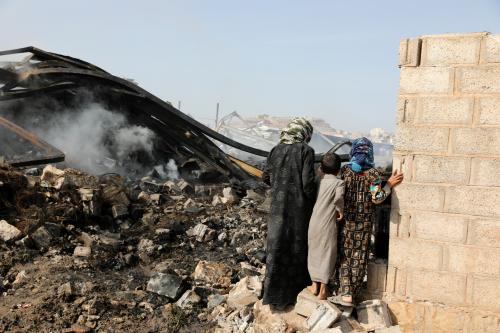
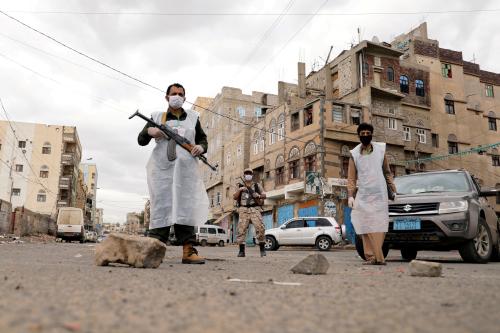

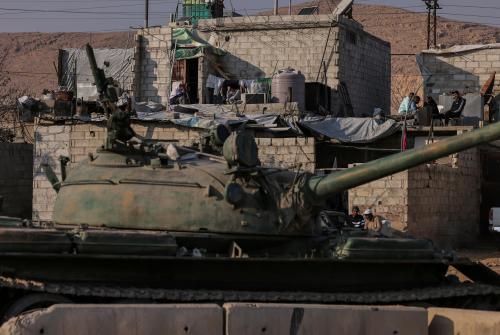
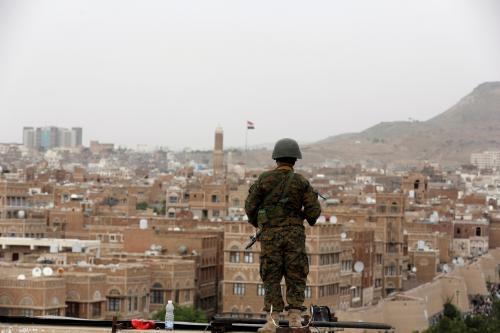
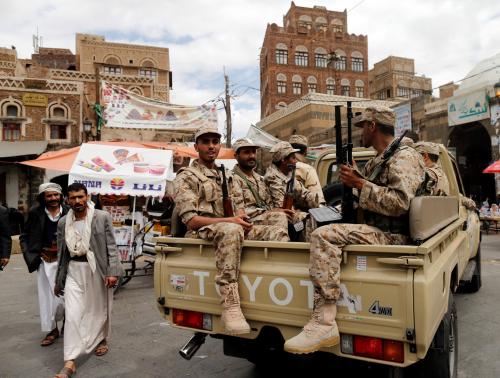
Commentary
A pragmatic view on Yemen’s Houthis
January 11, 2021